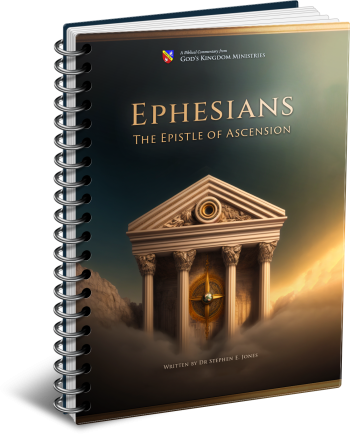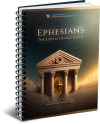Latest Posts
View the latest posts in an easy-to-read list format, with filtering options.

Paul's epistle to the Ephesians is, in some ways, a continuation of his epistle to the Romans. It enlarges upon Romans 1-8 in regard to the believer's position and right standing with God. We are "seated" with Christ, so we must "walk" according to our calling, and "stand" in the full armor of God against those who would oppose us.
Category - Bible Commentaries

After Paul equates truth with light, which exposes secrets and repels the darkness, the next step in his logic is given in Eph. 5:14,
14 For this reason it says, “Awake, sleeper; and arise from the dead, and Christ will shine on you.”
Here the apostle refers to Isaiah 60:1,
1 Arise, shine; for your light has come, and the glory of the Lord has risen upon you.
Paul tells us that God was commanding the “sleeper” to arise. Sleep was a common euphemism for death (1 Cor. 11:30; 15:20, 51). Hence, “arise, shine” is a command to rise from the dead. The grave (sheol) was also pictured as “the land of darkness” (Job 10:21). So Paul interprets “your light has come” to mean “Christ will shine on you,” implying resurrection and transfiguration.
There are two layers of meaning to this. Resurrection can mean coming forth from a tomb, or it can mean being enlightened by the word of truth. The latter is how Paul applies the idea in verse 14. If any of the Ephesians had been walking in darkness, they were to “arise, shine,” that is, “walk in the light, as He Himself is in the light” (1 John 1:7). In other words, live the kind of life as if you are resurrected beings, as symbolized by your baptism (Rom. 6:4, 8, 9).
The way of life for a believer ought to be one in which the old self has died and the new self has been raised up in its place to walk in the light and glory of the Lord. There is, of course, more to come at “the redemption of our body” (Rom. 8:23), but today we ought to walk worthy of this holy calling (Eph. 4:1). We are to reckon our old self to be dead, having transferred our identity to the new self.
Eph. 5:15-17 says,
15 Therefore be careful how you walk, not as unwise men but as wise, 16 making the most of your time, because the days are evil. 17 So then do not be foolish but understand what the will of the Lord is.
Godly wisdom is knowing, understanding, and following His will (thelema). Paul says in Rom. 2:18,
18 and know His will [thelema] and approve the things that are essential, being instructed out of the law.
By His will, all things were created through the wisdom of God. Whenever God speaks, we ought to treat it as a law in that His word requires obedience. Hence, the entire word of God is a law—not just the Torah itself, but also the prophets, psalms, and the New Testament writings.
The world of unbelievers is the realm of death, darkness, and foolishness, Paul says. It is characterized by their lack of understanding of “what the will of the Lord is.” But believers are different, for they have been instructed from the word of God—written and spoken—in godly wisdom that has enlightened them and raised them from the dead even prior to the resurrection.
Paul contrasts wisdom with foolishness without expounding upon this. For more explanation of this contrast, we must study 1 Cor. 1:18-27, where Paul speaks of the opposing views about wisdom and foolishness. The wisdom of God is foolishness to the world, while God Himself views the world’s wisdom as foolishness. It all depends on one’s standpoint.
Eph. 5:18-20 says,
18 And do not get drunk with wine, for that is dissipation [asotia, “abandonment”], but be filled with the Spirit, 19 speaking to one another in psalms and hymns and spiritual songs, singing and making melody in your heart to the Lord; 20 always giving thanks for all things in the name of our Lord Jesus Christ to God, even the Father.
The word dissipation is not a common English word. The Greek word asotia properly refers to one who has been abandoned, as if he is too far gone to be salvaged—i.e., one who is “hopeless.” In this case, Paul uses the term to describe an alcoholic who drinks constantly as a way of life. He contrasts such a life with a believer who is “filled with the Spirit,” conducting his/her life with joy, music, and thanksgiving.
Paul treats this as the normal risen life.